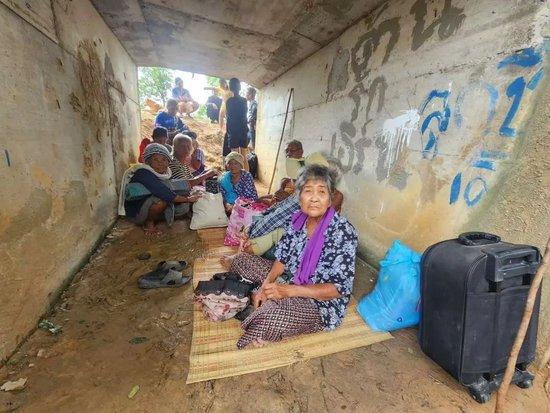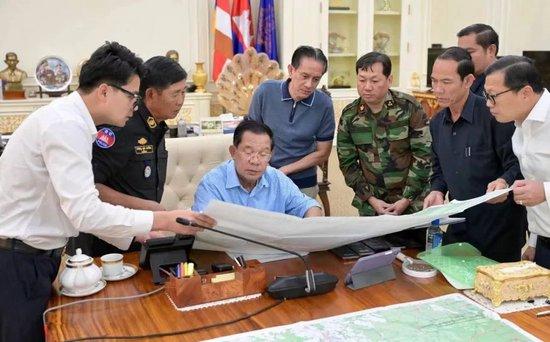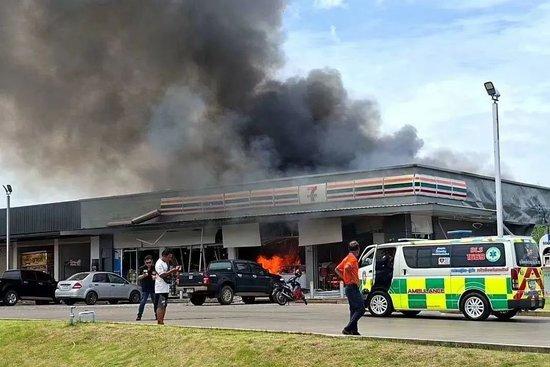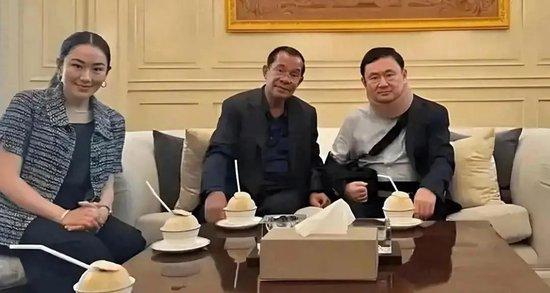



China’s surrounding countries have once again started a fierce conflict.
It is particularly heartbreaking to say that these two countries, both having good relations with China, are facing a major showdown. One is Thailand, often referred to as “Thailand and China are one family”; the other is Cambodia, sometimes known as “Cambodia and Iron.”
However, on July 24th, these brotherly nations engaged in a fierce battle across six border regions, using drones, artillery, and rockets.
According to Thai reports, the conflict resulted in the death of one Thai soldier and over ten civilians. Following this, Thailand deployed four F-16 fighter jets to destroy two command centers in Cambodia.
Both sides accused each other of firing the first shot.
The Thai Culture Minister and the recently suspended Prime Minister, Prachatep, accused Cambodia of launching a remote attack on Thai territory, stating, “I condemn the use of violence and aggression by Cambodia at the Thai border,” adding that the Thai military was fully prepared.
Her father, the former Prime Minister Thaksin, also criticized,
Hun Sen, the Chairman of the Cambodian Senate, was identified as the mastermind behind the bombings, directing Cambodian forces to set up bomb traps along the border before launching further attacks on Thai territory.
Thailand had legitimate grounds for retaliating militarily.
“Thailand initiated the attack on Cambodia,” claiming “Cambodian forces were forced to retaliate.”
His son, the Prime Minister of Cambodia, Hun Mak, stated,
“Cambodia has always adhered to the principle of peaceful resolutions, but under these circumstances, there was no choice but to respond with force.”
This marks the most intense border conflict between Thailand and Cambodia in over a decade.
However, candidly speaking, the conflict was anticipated from the outset. The developments inevitably led to a potential flare-up or even a small war between the two countries.
The initial trigger for the incident was a border skirmish in May this year.
A Cambodian soldier died in a gunfight with Thai border forces, leading to a sudden escalation in tensions between the two countries.
Afterward, Prachatep spoke with Hun Sen, referring to him as “Uncle.”
However, the content of private conversations was made public by the Cambodian side, causing a stir in Thai public opinion and being deemed weak.
This led to an escalation in relations between the two countries.
An explosion occurred at the border with landmines, injuring five Thai soldiers. Both sides recalled their ambassadors from their home countries and expelled the other’s ambassador.
Then, on July 24th, tensions flared up, followed by a full-scale brawl.
One thing that is truly remarkable is that in Southeast Asia, Thailand and Cambodia are considered brothers. The ASEAN countries have different beliefs but share the same faith as neighbors.
Hun Sen and his brother Hun Sen were old friends who had been in contact for decades, but now they seem to have severed all ties, unable to forgive each other.
It’s undeniable that the colonizers committed crimes in the past.
Thailand and Cambodia share over 800 kilometers of land border. Some of these border lines were demarcated based on maps drawn by French colonialists in the past.
This has left many hidden dangers and has led to border conflicts between the two countries sporadically for the past century.
The most contentious issue is the ancient temple, which has been the subject of disputes for centuries.
In 1962, the International Court of Justice ruled that the sovereignty of the area around the temple belonged to Cambodia, but the Thai government refused to accept it.
In 2011, multiple military clashes occurred, resulting in about 20 deaths, prompting Cambodia to appeal to the International Court of Justice again; the court reaffirmed its original ruling in 2013, but Thailand still refused to comply.
Territorial sovereignty is a sensitive issue, and neither side is willing to compromise easily.
The leakage of phone calls between Phanomyothin and Hun Sen further reduced each party’s room for maneuver. The strong stance of Cambodia on the border issue, along with the frustrated and simmering emotions among Thai leaders, inevitably led to this conflict.
The bad news is that the fire has already been lit, and if it cannot be effectively controlled, it could spark a conflagration that could even lead to a small war.
The good news is that both sides remain relatively rational, with the conflict confined to limited border areas. Neither side has declared war, highlighting a strong desire for diplomatic resolution.
Cambodian Prime Minister Hun Sen sent a letter to the United Nations, requesting an emergency meeting of the Security Council to “take measures to stop the Thai side from infringing on Cambodia’s sovereignty.”
Thai Foreign Minister Maray arrived at the UN headquarters in New York immediately to report on the situation at the Thai-Cambodian border conflict.
Additionally, regarding Thai media reports that “Hun Sen has flown to China on a special plane,” Hun Sen personally posted images on social media, stating that he has been deploying combat operations with the leadership team. “I have not fled anywhere; the people of the nation need not worry!”
Of course, the photo is clearly staged. This can be seen as a form of propaganda warfare.
After the conflict between Thailand and Cambodia occurred, China also immediately made a statement.
During the Ministry of Foreign Affairs meeting on the 24th, spokesperson Guo Jia Kun said:
Both Thailand and Cambodia are friendly neighbors and important members of ASEAN. Mutual goodwill and resolving differences are in line with their fundamental and long-term interests.
We are deeply concerned about the current developments and hope that both sides can resolve the issues through dialogue and consultation. Starting from the common interests and demands of regional countries, China upholds a fair and impartial stance. We have already and will continue to work towards reconciliation and promote talks in our own way, playing a constructive role in de-escalating the situation.
1. China is deeply concerned about the developments.
2. Your reconciliation aligns with your fundamental and long-term interests.
3. China will strive to facilitate reconciliation and promote talks, playing a constructive role.
The two countries are both friendly neighbors of China, and their disputes do not concern China in any way. The specific details of friction are subject to public debate.
Why does Thailand attract tourists worldwide? It’s because of its unique landscape and distinctive culture, but one fundamental premise is Thailand’s stable environment.
Without stability, international tourists would shy away, and Thailand’s economy would suffer greatly.
Cambodia is also facing this challenge. Compared to Thailand, Cambodia has more pressing tasks for development and urgently needs a stable and peaceful environment.
领土主权牵动敏感神经,应对不当危及自身统治。这就更需要两国领导人有大智慧,既捍卫自身权益又给对方留有余地,妥善解决这个历史遗留问题。
自己解决不了,儿子女儿解决不了,孙子孙女又如何?
也不得不说,万恶的殖民者。
不仅仅在东南亚,在南亚,在中东,在世界很多地方,埋下了多少冲突的隐患!
唉,也不得不说,他信和洪森,多年老友,现在却翻脸成这个样子,何必又何必,真是亲者痛仇者快。
做人,要有原则和格局,更要有远见和智慧。
凡事留一线,日后好相见。
泰国和柬埔寨,听中国一句劝,真的是和为贵!